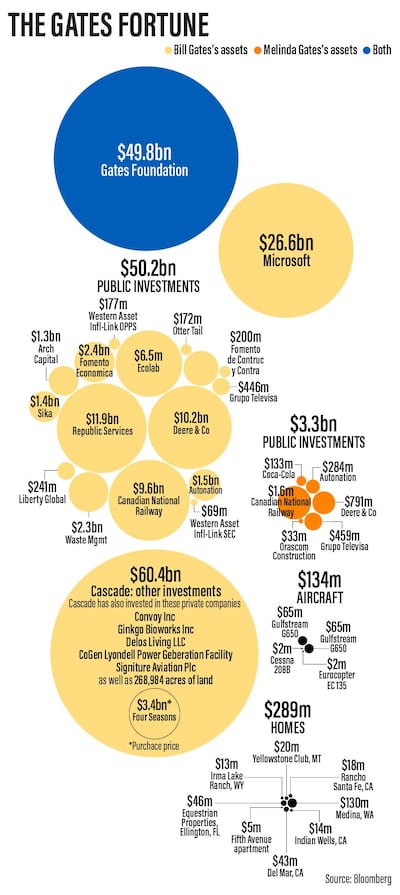The divorce, on paper, sounds common enough: the years go by, the children grow up, the couple drift apart. The marriage, they finally tell a court, has become "irretrievably broken".
But that is where the familiar outlines of many a break-up end, because this one concerns Bill and Melinda Gates.
In financial terms, this is a split for the ages. Untangling their combined fortune after 27 years of marriage is a colossal undertaking.
There are the mansions, private jets, vast tracts of land, a hotel brand and massive investments in public corporations and private businesses.
Then there is the Bill & Melinda Gates Foundation – the largest philanthropic organisation of its type on the planet.
"They are probably about the biggest divorce imaginable," said Janet George, a family lawyer at McKinley Irvin in Washington.
The work has already begun, starting with a separation contract, according to the petition for divorce Mrs Gates, 56, filed in their longtime home state of Washington.
She signed the papers from Bellevue, where they have a $130 million lakefront mansion. Mr Gates, 65, signed from Palm Desert, in southern California, where they own another home.
Representatives for the pair declined to comment on the divorce and whether they had a prenuptial agreement.
But a prenup, if there is one, would not matter, because the separation contract supersedes any previous agreement.
There have already been more than $3 billion of transfers from Cascade Investment, also known as BMGI (Bill and Melinda Gates Investments), to Mrs Gates, a sliver of their $145bn fortune at the time of the divorce announcement.
So far, there is no clear pattern as to how the shares are being divided.
The 2.25 million shares of Deere & Company Mrs Gates received are worth about $800m, but they made up only 7 per cent of the estranged couple's total stake in the company.
Meanwhile, she received all the company's shares in Coca-Cola Femsa, a Mexican distributor, worth about $130m.
It may never be made public what happens with their collection of private companies, such as the Four Seasons brand in which they bought a 47.5 per cent stake in back in 2007 along with Saudi Prince Al Waleed bin Talal.
Or their property investments, which make them the largest private farmland owner in the US.
Although not part of their fortune, one of the couple’s biggest assets is their foundation, which has $50bn in assets, more than 1,600 employees and offices globally.
Their philanthropy has particularly transformed the reputation of Mr Gates – from the monopolistic capitalist behind Microsoft to techno-geek do-gooder tackling global hunger and health.
The divorce has already cost Mr Gates some of that image, with reports of infidelity, his ties to Jeffrey Epstein and reports that his money manager Michael Larson operated a toxic work environment.
The couple have established their own philanthropic arms outside of the foundation and their interests have diverged in recent years, with Mr Gates focused on climate change and Mrs Gates on gender equality.
For the career philanthropists they have become, that means how the fortune is split will determine where funding flows to these causes for decades.


